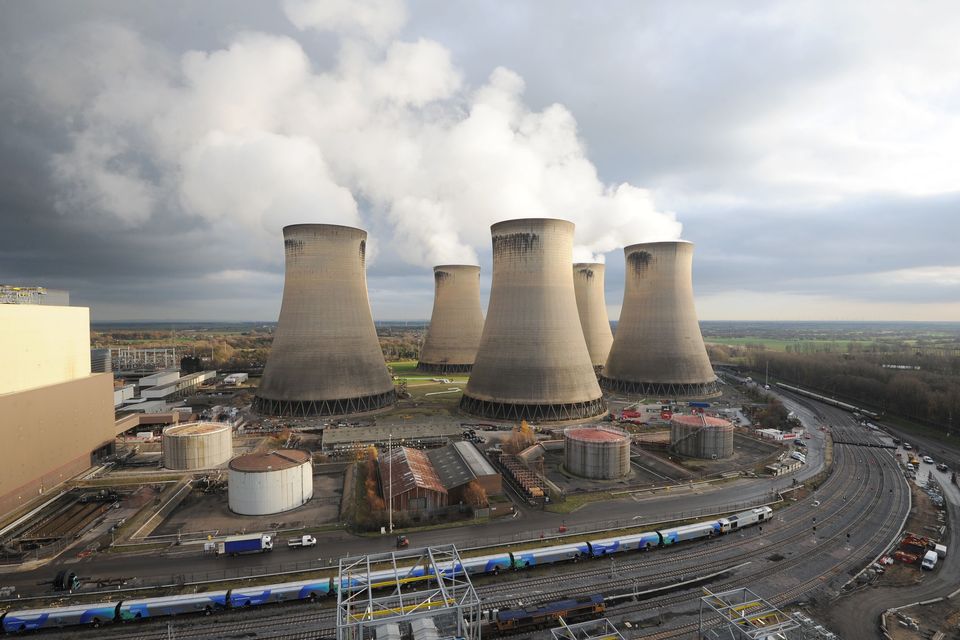Drax faces penalty after Canadian biomass plant fails to submit pollution report

Drax Power Station near Selby, North Yorkshire (Anna Gowthorpe/PA)
By Rebecca Speare-Cole, PA sustainability reporter
Power giant Drax if facing a penalty after one of its biomass plants in Canada failed to submit an annual report on pollutant emissions to the country’s environment regulator.
The pellet mill in High Level, Alberta, produces wood pellets for the company, which runs Britain’s biggest power station in Yorkshire.
However, Environment and Climate Change Canada (ECCC) said the plant did not submit a 2022 report by June 1 this year as it was legally required to do under the National Pollutant Release Inventory (NPRI).
The reporting relates to permitted levels of hazardous compounds (VOCs) and particulate matter, which can harm human health.
The regulator said companies that fail to report on time face penalties under the Canadian Environmental Protection Act, which could issue tickets that carry financial penalties, written warnings, directions, Environmental Protection Compliance Orders (EPCOs) and possible fines of up to 500,000 dollars (£300,000).
Drax Canada told the PA news agency that the report was not submitted due to an “unintended administrative oversight”.
The company, which receives billions in green subsidies from the UK Government, is currently facing an investigation by the energy regulator Ofgem into the sustainability of the biomass it uses at its wood-burning plant in Yorkshire.
It comes after a BBC panorama investigation alleged that some of the wood comes from primary forests that had been cut down by the company in Canada.
The company was also found to have paid millions to US regulators over claims it exceeded limits on chemicals emissions and VOCs.
In an email to Bertie Harrison-Broninski from Land and Climate Review, seen by PA, an ECCC spokesperson said the regulator has contacted Drax for an explanation as to why it has not submitted its report.
They added that ECCC is currently aiming to publish the reviewed 2022 NPRI data towards the end of November, but that it is unlikely any update from the High Level pellet mill will appear
The spokesperson said: “Regulatees are expected to act responsibly when they are subject to requirements set forth in the regulations and should always exercise due diligence.
“ECCC enforcement officers consider, on a case-by-case basis and in accordance with the Compliance and Enforcement Policy for the Canadian Environmental Protection Act, 1999, any damage to the environment, any other aggravating factors, and whether reasonable efforts have been made by an individual or company to remedy or mitigate the consequences of non-compliance.”
Patrick Anderson, a lawyer for the Southern Environmental Law Centre in the US, said: “Accurate and timely emissions reporting not only holds polluters accountable but allows regulators to protect the public from the cumulative impacts of regional emissions.
“This is especially important in areas like Alberta, where parts of the province have recently exceeded air quality standards for fine particulate matter and ground-level ozone, or smog.
“Drax’s wood pellet plants are significant emitters of fine particulate matter and VOCs, which cause ground level ozone, so Drax’s failure to report these emissions in Alberta is particularly problematic.”
Tom Harrison, electricity transition analyst at global think tank Ember, said: “The possibility then that there are also serious pollution and emission problems of particulate matter, or whatever it may be, further down early in the supply chain of wood pellet sourcing production only adds to this really risky nature of biomass as a fuel source.”
He added: “It’s essential that we know the full of what the public energy bill payer is paying for in the UK.
“We need to know what the emissions are in the UK from biomass, what the real emissions are in the UK from biomass, but also what are the implications and effects of us supporting Drax in the UK.
“And if we don’t have that information, we don’t have that data, we can’t be making the best informed choices.”
Meanwhile, Tory MP Selaine Saxby said: “Whilst woody biomass has been a key stepping stone in our transition away from burning coal, it is becoming increasingly clear we should focus on developing truly renewable and sustainable energy sources such as wind and solar.”
Burning wood is considered green because new trees are planted to replace the old ones, but it is controversial among environmentalists.
The Drax power station in Yorkshire is a converted coal plant, which now produces 11% of the UK’s renewable electricity by burning biomass.
The company has said it only uses waste from the forestry industry to make wood pellets and takes its environmental responsibility towards communities extremely seriously.
A Drax Canada spokesperson said: “While our 2022 report was filled out and approved internally, our team has noted that it was not submitted by the June 1, 2023 deadline.
“This was an unintended administrative oversight, and we are taking immediate action to correct. We have a positive relationship with our regulators, are in contact with ECCC and are already working to resolve this quickly.
“At Drax, we are committed to the highest level of environmental and safety standards. That’s why we regularly test the air quality of our plants and report our environmental footprint to ensure we meet local, provincial and federal compliance regulations.”
The spokesperson added that Drax will work with ECCC on the outcome they determine.
No comments:
Post a Comment